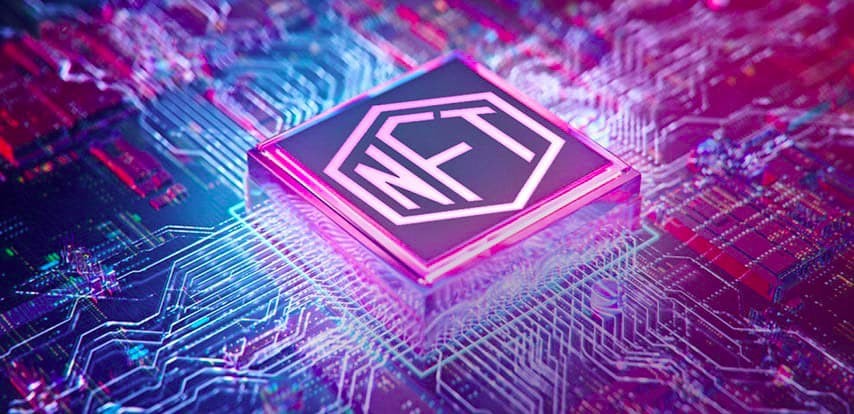Blog Detail
How Can NFTs Be A Game-changer In Revolutionizing Trade Finance?

NFTs have been a hot topic these days. And if you know a little bit about blockchain space in trade finance, you have probably noticed a lot of hype around these NFTs, or Non-Fungible Tokens. But, what are they? Almost every day, there is a newly published article on it stating the emerging popularity of people trading NFTs, digital art, and collectibles for extremely high prices. They are marking their presence rapidly as the latest blockchain-based innovation. This blog will shed light on this insanely surging section.
What are NFTs (Non-Fungible Tokens)?
1. Non-Fungible Tokens, or NFTs, are Ethereum-based digital tokens that are being used to show the digital ownership of unique things/items.
2. To put it simply, NFTs allow artists to declare/release their unique work digitally without experiencing the threat of counterfeits. Though a copy of an NFT can take place, it won’t be original.
3. People can tokenize different things like art, collectibles, and even real estate. It can only represent one official owner at a time, secured by this Ethereum-based blockchain ie. the records of the owner cannot be modified, corrupted, or copied. Apart from this, these tokens are non-fungible i.e. each token is unique and not interchangeable.
4. These can be expensive though, it is more than just a JPEG file. It provides you ownership rights and you can sell your NFTs on marketplaces like Opensea and Nifty Gateway. It is similar to traditional artwork but on a digital platform.
NFTs are cryptographically secure ways of possessing a unique asset. Once the asset, regardless of its type, is tokenized, it cannot be modified.
Recommended Read: How Digital Trade Finance Is Improving Trade Transactions For Importers & Exporters?
NFTs In Trade Finance
In a digitized global trade system, where NFTs are being used to show the proof of ownership or possession of important unique things digitally, it could revolutionize trade finance. Take Bills Of Lading for an example. This document shows the ownership of the shipment which is required by the consignee to present it to the shipper to claim the delivery of goods. Though electronic bills of lading are not in use, if they could be tokenized as well, they could be immediately sent across to show ownership, making the process of Letters of Credit much easier. If an entire shipment can be tokenized on a decentralized platform, it could prevent supply chain disruptions and international trade fraud. Of course, this is a simplified & imagined example, and many details are there to be accounted for. However, the basic idea could soon revolutionize the trade industry.
Recommended Read: What Are The Major Challenges In Trade Finance And How To Manage Them?
Even since trade finance has come into existence, it has been provided by centralized institutions that occasionally can be combined with unintentional failures on transactions, investments, and trade contracts. There can be inefficiencies & glitches to access these services. Here blockchain & smart contracts can surely augment the trade finance industry by accelerating trade transparency and offering completely verifiable transactions with immutable codes that ensure secure contracts and allow transfers when specific criteria have been fulfilled.
NFTs In Supply Chain
One crucial aspect of trade finance that is prone to be revolutionized via NFTs is none other than supply chain management and automated payments. The supply chain plays a vital role in the smooth functioning of a trade transaction and ensures an on-time transfer of goods by ensuring a synchronized flow of goods & payment.
With the introduction of blockchain, both of these two important concerns can be embedded into a single network along with the reduced amount of paperwork such as Purchase Order, Invoice, Payment, and Receipt, etc. between clients and their suppliers. Blockchain-based supply chains can allow an uninterrupted flow of both payments & goods on the same network. It will not only help in reducing the need for reconciliation at each stage in the supply chain but also helps the industry to reach areas that have a lack of access to financial institutions. By resolving issues of authentication, transparency, and liquidity that fuel the global trade, tokenization via blockchain can boost supply chain performance and trade finance revenue.
Recommended Read: What Makes Trade Finance A Better Choice Than Legacy Banks?
Additionally, it can also help in getting access to every step involved in the shipping process, payment and the accuracy of each delivered goods along the way with minimum human failures will help in revolutionizing the trade finance industry.
NFTs In Debt Management
Another essential area that is going to be highly benefited from these improvements is the ability of an organization to track and manage its debt. Various departments usually need to handle this area of commerce. Smart contacts can automate different steps in trade finance like approvals and shipments that can only be moved forward when the blockchain has allowed a specific payment amount, signature authorization, etc. To put it simply, debt management can be executed in real-time.
Pros & Cons of NFTs
NFTs are associated with a few pros & cons as well. Let’s find out:
Pros:
1. Digital buying & selling are easier with non-fungible tokens.
2. They are secured by blockchain, ensuring verified artwork and digital ownership.
Cons:
1. The boom of NFTs has increased prices for some collectibles and they can face trouble holding their significance for a long period.
2. If NFTs are not stored safely, they can be exposed to the risks of being hacked just like cryptocurrencies.
Future of NFTs
Currently, NFTs are being used to trade art & other collectibles. Once they are completely implemented, NFTs with Blockchain can bring a new era of trade finance & banking, improving customer experience and accelerating global trade. In the upcoming time, NFTs can be used to tokenize real-world assets, also making ownership non-fungible. They could be beneficial for real estate agreements, vehicle titles, and business ownership.







